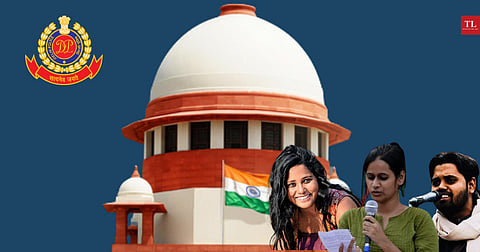

A day after the Delhi High Court granted bail to Asif Iqbal Tanha, Devangana Kalita and Natasha Narwal in the Delhi Riots case under the Unlawful Activities (Prevention) Act, the Delhi police has approached the Supreme Court by way of an appeal challenging the high court order.
All three-Narwal, Tanha and Kalita are yet to walk free despite the court ruling.
A Delhi High Court bench of Justices Siddharth Mridul and Anup J Bhambhani held that no prima facie case was made out against all three accused under the UAPA and then went on to state, "…In its anxiety to suppress dissent… the State has blurred the line between the constitutionally guaranteed 'right to protest' and 'terrorist activity'."
The Delhi police sought to argue that Section 15 of the UAPA which defines "terrorist act", contemplated not only an act 'with intent to threaten' the foundations of a nation but also any act 'likely to threaten' such foundations.
The court rejected the argument of the Delhi police and said "the foundations of our nation stand on surer footing than to be likely to be shaken by a protest, however vicious, organised by a tribe of college students or other persons, operating as a coordination committee from the confines of a University situated in the heart of Delhi."
The allegations against Tanha, Kalita and Narwal are that they engaged in various steps and actions, the object of which was to organise a protest against the Citizenship Act and National Register of Citizens(NRC) and take it to a crescendo that would lead to a chakka jaam (traffic jam), so that supplies and services to the people of Delhi are adversely affected; and also to spread fear and cause riots. All the three are facing charges both under the Indian Penal Code(IPC) and the UAPA- a law in which grant of bail is almost difficult if the allegations are, prima facie, true.
The court held that the restrictions under Section 43D(5) of the UAPA would not be attracted since no prima facie case against the accused were made out on the basis of the charge-sheet and the material collected and cited by the prosecution.
The court also opined that even if it is assumed that in the present case the protest in question crossed the permissible limits and went into the forbidden realm of a non-peaceful protest, there was nothing to show that the government had prohibited the protest at the relevant time, much less was there anything to show that the appellant was the perpetrator or conspirator or was involved in any illegal protest.
Whatever offences are alleged to have been committed by reason of the protests having turned non-peaceful, the court said, was the subject matter of another FIR in which the accused was already granted bail.